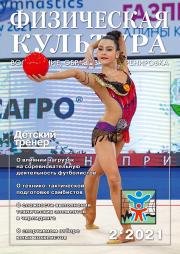Изображение:
Physical education: education, training №2 2021
SPORT RESERVE TRAINING
T.V. Mikhailova, A.S. Tsutskova – Effect of personality traits on sports progress of academic rowers of sports perfection groups © ►►►pp.2
L.G. Ryzhkova, A.B. Moiseev, A.D. Kravtsov – Relationship between elite female fencers’ psychodiagnostic indicators and heart rate during functional tests © ►►►pp.5
V.R. Solomatin, E.K. Inake – Training load intensity as key factor in training long-distance swimmers within yearly training cycle © ►►►pp.8
A.V. Shunko, T.A. Kravchuk – Model characteristics of general and special physical fitness of highly-qualified speed climbers © ►►►pp.10
ACADEMIC PHYSICAL EDUCATION
A.B. Bguashev, I.K. Gunazhokov, M.Kh. Kojeshau, B.A. Nepso – Level of formation of personal physical culture of non-core university students © ►►►pp.14
A.V. Astakhov, N.I. Dobeiko – Cyclic sports driven physical education model for endurance building in senior schoolchildren © ►►►pp.17
V.V. Bobkov, L.G. Ryzhkova, M.A. Kuzmin, N.S. Yaunbaeva – Analysis of running test rates in population under RPCS GTO program © ►►►pp.20
V.V. Izvekov, K.V. Izvekov – Physical education classes to stimulate self-improvement activities of first-year university students © ►►►pp.23
D.A. Blinov, E.E. Zhigun, G.V. Barchukova – Rating of attention indicators in university students under academic physical education and sport discipline © ►►►pp.26
HISTORY OF PHYSICAL EDUCATION AND SPORTS
A.A. Perevoznikov – Moscow society to promote physical development and its role in popularization of physical culture in late XIX - early XX centuries © ►►►pp.29
BIOMEDICAL PROBLEMS OF PHYSICAL EDUCATION AND SPORTS
M.Y. Stepanov, M.B. Salamatov, G.S. Maltsev – Heart rate variability test to assess effects of breathing hydrogen mixture on athletes’ body © ►►►pp.32
R.V. Tambovtseva, G.A. Schmidgal, I.A. Nikulina, E.V. Pletneva – Effects of additional ergogenic aids on functional and biochemical rates in kettlebell-lifters © ►►►pp.35
V.A. Shalabodina, A.M. Volkova – Conscious attention technique as factor for improving hypoxic training © ►►►pp.39
M.A. Sharovarova, E.T. Kolunin – Hormone profiling based individualized fitness model for senior women © ►►►pp.42
APPLIED PROFESSIONAL PHYSICAL TRAINING
S.N. Tregubova – Blended learning for future bachelors of institute of physical culture © ►►►pp.45
E.M. Barienikov – Defensive driving instruction based on safety zones © ►►►pp.48
D.V. Loginov – GTO complex pre-test training model for 50-59 year-old teachers: programmatic and practical guidelines © ►►►pp.51
M.L. Listkova, L.K. Sidorov, V.V. Ponomarev – Psychophysical training model for music department students © ►►►pp.53
ADAPTIVE PHYSICAL EDUCATION
A.P. Shklyarenko, T.G. Kovalenko, D.A. Ulyanov – Adaptive physical education tools to eliminate muscular overstrain in infants with acquired torticollis © ►►►pp.56
«CHILDREN'S TRAINER» – journal in journal
A.K. Belyakov, E.A. Belyakova – Effect of training loads of various purposes on competitive performance of footballers in short intergame cycles (3-4 days) of competitive period © ►►►pp.60
G.S. Maltsev, A.F. Zekrin – Modern approaches to improving quality of technical-tactical training of skilled sambo wrestlers © ►►►pp.62
A.V. Petrushenko, I.V. Manzheley – Subjective difficulty of cheerleading elements © ►►►pp.64
V.V. Krutskikh, D.R. Cherenkov, A.A. Gustomyasov – Sports selection of junior ice hockey players – systemic logistics of fitness levels in ice hockey © ►►►pp.68
MANAGEMENT IN PHYSICAL EDUCATION AND SPORTS
E.V. Kuzmicheva, M. Shafik – Evaluation of information transparency of sports federations © ►►►pp.71
V.I. Scaliush, I.V. Afanasyeva, L.N. Vergo, M. Moor – Introduction into working process of methodological developments on minor forms of extracurricular applied professional physical training © ►►►pp.74
V.E. Khaliulin, A.A. Shapovalov – Conceptual approaches to formation of physical education and sports development strategy implementation mechanism in the Russian Federation for the period up to 2030 © ►►►pp.77



 Журнал "THEORY AND PRACTICE
Журнал "THEORY AND PRACTICE